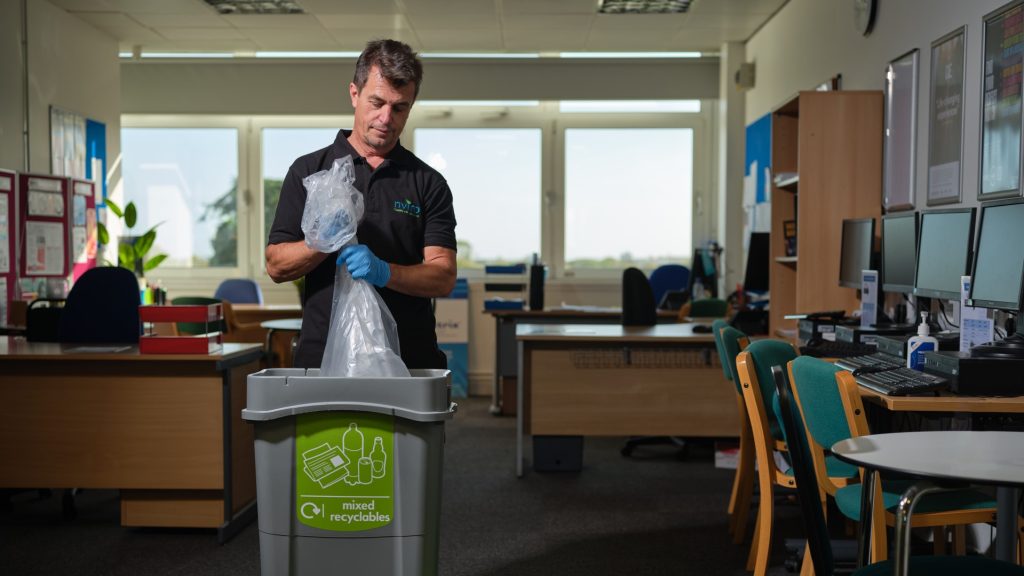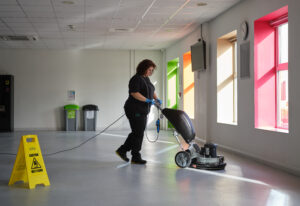Keeping costs down – how small changes can make a big difference
01 October 2022 Category: Schools, Academies and Trusts
A hygienic room is a happy room. And at Nviro we’re all about creating environments that are clean, hygienic, and safe to enable students to fulfil their potential / deliver the best learning outcomes.
We’re always looking to fine tune our strategies to make that happen. Sometimes that can be by delivering surface protection to your school or bringing in cobotics. Other times, that’s by letting our cleaning colleagues use their own experience to survey a room instead of focusing on a checklist. And sometimes it’s the simple things that help, like asking students and teachers to consider housekeeping. It’s simple to do, and it makes a noticeable difference.
Housekeeping or cleaning?
Don’t worry! When we talk about housekeeping in schools, we aren’t asking you to take out the bleach and rubber gloves and start next to the art supplies. Anything that requires rough chemicals and a bit of elbow grease isn’t what we mean by housekeeping.
If you’re privileged enough to have a domestic cleaner, housekeeping is the equivalent of doing a quick tidy-up of the toys and floor to make space before the cleaner arrives. They are coming to help keep your home clean and safe, so you don’t want them to waste their time on clearing the obstacles first.
A lot of this is obvious – putting chairs on tables and completely clearing desks was once an expectation of children in all schools across Britain. Washing up mugs and plates in the staffroom is obvious for anyone who wants to avoid getting a reputation in the office for being messy. It also happens to be a way to make cleaning teams much more efficient.
Other housekeeping strategies are more considered: in one of our schools, we’ve been trialling centralised bins, rather than one in every classroom. The environmental impact on this has been great. Centralised bins mean room for separate landfill and recycling sections. Fewer bins also mean fewer bin liners, and, importantly, it cuts down on cleaning time too.
Does it make a difference?
We get that this isn’t the first thing a teacher thinks about when it comes to teaching a class. Nobody’s queuing to pick pencils up off the floor, and we know that it’s an ask when we request teachers to consider tidying as part of their day. But these small, individual tasks are the ones that can take moments for a group of 30 students per class, or take far longer for a cleaning team to do in every classroom across an entire school.
The added time it takes cleaners to do these simple tasks transfers into more money spent on the cleaning budget. So if housekeeping feels uninspiring as a teacher, consider that when you and your students are reducing expenditure, you suddenly have more leverage with the bursar.
The work you do here can give greater credibility when you advocate for an investment on up-to-date textbooks, or funding for school trips. Housekeeping allows us to enter an environment and complete the process of cleaning more efficiently and more quickly. But it benefits you, too.
A little bit of O-soji
For as appealing as new textbooks or school trips are, you could also consider the benefit that housekeeping has on students. The act of tidying is an activity that benefits a child by virtue of them doing the tidying itself.
Let’s look at O-soji.
O-soji is the Japanese word for cleaning, and in Japan it is an in-built feature of the school day for all students. The cleaning can involve sweeping, scrubbing, tidying the toilets – it’s even not unheard of in some schools for students to wear indoor slippers to prevent the build-up of grime.
It is not lost on Japanese educators that the mess and chaos generated by a school-full of students can be fully balanced out by the force of children each pooling together to tidy. But this isn’t an activity that exists for the sake of cutting down the janitorial budget.
O-soji creates a sense of responsibility in students. It promotes the concept of good citizenships, and teaches children how to take responsibility for their environment within a healthy society.
This isn’t an idea restricted to Japan. The Singaporean Ministry of Education has implemented student-led tidying on a national scale, and the trend has started in schools in the UK, too.
Appreciating the importance of a clean environment
A further benefit to encouraging students to tidy is that it gets them to consider and value the role of the cleaner.
The children learn to tidy up after themselves, rather than expecting someone else to do it. And they become more aware of their environment and their personal impact on it – which may encourage them to be more vigilant when it comes to handwashing, which could prevent 17 million of the gastrointestinal infections that occur each year.
Cleaners absolutely can come into a school and clear the desks, put chairs on tables, and so on. But fundamentally, the professionals come in to do the jobs the children can’t do.
Clear desks mean our cleaning teams can start wiping down the surfaces quickly. Clear floors mean we can set the cobots down to do their job, which enable our people to tackle everything faster, or be strategic in where they focus their attention, or address the issues that will make the most difference to the wellbeing of your students.
Our cleaners are skilled and resourced to create clean, hygienic and safe spaces. If they’re there to do the complex tasks, will the best use of their time be in the basic tidying?
We’re not looking to sell magic beans at Nviro. Encouraging students to engage in basic cleaning isn’t going to turn each of them into the perfect, prosocial citizen, or cut the cleaning budget to nothing. But if the small and simple forms of housekeeping will lead to budget improvements, a cleaner school, and a better outlook from the students, why not give it a go?
As a specialist cleaner in educational settings, Nviro provides clean, hygienic and safe environments in universities, colleges and schools. Read our blog about how cobotics can give your cleaning teams a boost.


